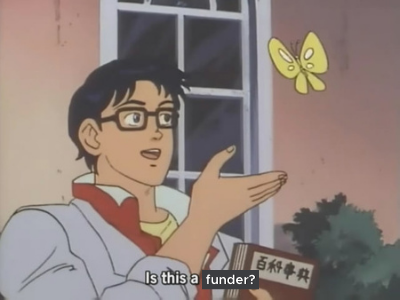When I’m speaking with new clients, I try to rid myself of some of the jargon and shorthand we use in fundraising. Even so, I am a mere mortal nonprofit fundraiser, and so some always sneak through.
One word is “funder.”
Whenever I begin to talk about foundations, institutional funding, and funders versus donors, I inevitably am stopped with the question “what do you mean when you say ‘funder?’”
What is a Funder?
In general, when I say “funder,” I’m referring to those business or organizational entities that grant funds: foundations, corporations, and government agencies. These will also be called “institutions.”
We draw a distinction between funders and individuals in fundraising mainly because you approach them differently when asking for support. You will typically approach funders via a written application at some point in the process, while with individuals, you should be focused more on cultivation and fundraising campaigns.
But this general overview does not take into account the fact that funders are as diverse in their structure, processes, and interests as individuals are. This means that, often, nonprofits are confused because they lump all funders into one category, when in actuality you should be cultivating funders and building relationships with them just as you would with your individual donors.
While it is absolutely appropriate to simply send an application to many funders, for others it is in fact harmful for you to send anything before you speak with them. On the flip side, some funders specifically do not take calls if you are not already funded by them, and so trying to contact them would be detrimental.
I’m frustrated for you, just writing that!
This is why it’s so important to treat your funders as you would individuals, in some ways. You would not simply send a letter asking for a donation to a random address on the street. Instead, you would start with an individual who has shown some interest in your work or has some relationship to your team, and cultivate them further before asking them for a large donation. In the same way, you should cultivate relationships with funders, when possible, before you apply, and always once they award you a grant.
Steps to Cultivating Funder Relationships
Research
The first step to building a relationship with a new funder is research. If they have a website, review it for information that is useful. This could include:
- names and addresses of board members;
- the address and phone number of the foundation;
- their grant guidelines, along with information about whether or not they take phone calls or unsolicited requests;
- past grants they have made, in what amount, and to which organizations;
- and more.
If a funder does not have a website, Guidestar.org is a great resource for doing your funder research. After creating a free account, you can search for your funder by name and look at their 990 tax document. On this document are a few key pieces of information.
- On page 10, you can find information about the application process including a small check box which will tell you whether they will take an unsolicited application.
If this box is checked, it means you can not send them an application unless they have requested it from you.
If this box is not checked, then you are free to send them an application. - Further down in the document, you can find a list of grants that they made in that year and to which organizations they granted funds.
- Also in this document are typically a list of board members as well as contact information for the funder.
Want more information about how to read a 990? Our Simple Guide to Institutional Fundraising in the Arts has more useful information about funder research!
Contact the Funder
So you have a bunch of information, what’s next?
Before you apply, you should try to get in contact with the funder. Unless they specify otherwise, call them up to ask them about their funding priorities and introduce them to your organization. This is not a sales call! So come equipped with a few smart questions about their Foundation as it relates to your work, do not simply come with an elevator speech.
These calls can be very useful. Funders may clarify their priorities, let you know whether they are seriously considering applications from organizations like yours, or give you other two bits that can help you know whether it is appropriate for you to apply or not. Most importantly, it shows that you are thoughtful and serious about your work and such a great tone with a thunder.
Again, many funders will not take calls and will not respond to yours! Do not be insulted if this happens.
Invite Funders to Your Work
The next point of cultivation is to invite funders to your work. This is an important part of cultivating both current funders and prospects. Just like you would invite a major donor prospect to a show, it is absolutely appropriate to send personal invitations to funders to see your work.
Think about the contact at each funder as you would an individual. Which of your projects is most interesting to them, considering their mission? Do you think they will be more impressed by a small, invite-only reading, or a large production with a packed house? Some funders have rules around accepting free tickets, but it is still appropriate for you to extend the invitation.
It is so important for funding prospects to see your work so that they can put your application in context, and for current funders to see your work so that they can see the impact of their investment.
Be Creative
When it comes to funder cultivation, feel free to be as creative as you are with your artistic work!
- Has an artist created an impactful visual piece? Make it into a postcard and send it!
- Are you in the rehearsal room for a while, with no public programs? Send the funder an email from the rehearsal room, with a few images and a special note from the director.
- Does a specific funder always show up to your productions? Invite them for a post-show drink with one of the performers.
See Funders as Individuals
In reality, a funder is not an institutional entity, but the individuals working within that entity. And so treat them as such! Do not be annoying, but do be consistent. Follow through on your promises. Don’t push them to support something they are not interested in.
And just like making friends with a random stranger on the street is a lot harder than with a friend of your friend that you meet at a party, going after random funders that come up in a search engine is way harder than building relationships with those who are already in your network.
This means that, if a Board member has a connection to a small foundation, it is almost always worth it to try to connect with that foundation, even if you only tangentially fit their mission. All foundations have a bit of discretionary money set aside for groups that they are very passionate about, so you want to convince them that you are that group!
Want some help strategizing your funder cultivation plan?
Sign up for a FREE 30-minute call with Founder Sarah Benvenuti to see how we can help!






